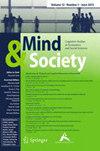Unravelling the ‘Help’ in Self-Help
Q1 Arts and Humanities
引用次数: 0
Abstract
The present article intends to explore the challenges faced by the urban professionals in reaching for the emotional and professional amidst the neoliberal marketplace, via the narratives salient in Self-Help texts. Self-Help texts embody metaphors that rely on agency bound “bootstrapping” narratives, where individuals are compelled to maximise their agency in terms of tangible profits and fulfil their calculated potential in the social marketplace of competition. The neoliberal marketplace obfuscates the existing inequalities through narratives of multiculturalism and individual empowerment. Deliberation through thematic analysis, this article intends to look into the emergence of the ‘achievable self’ through the prevalence of Self Help texts as a popular genre in the Indian scenario. It also seeks to discuss the mental health challenges faced by individuals in meeting the achievement benchmarks of the current ethos, and how Self-Help texts posit themselves as providing the means to do so. The emergent themes will be discussed in the article in detail. This article seeks to explore the relationship between the reader and self-help texts to better understand the process by which newer conceptualisations of mental wellbeing as an achievement benchmark have emerged.解读自助中的“帮助”
本文旨在探讨城市专业人士在新自由主义市场中寻求情感和专业方面所面临的挑战,通过自助文本中的突出叙述。自助文本体现了依赖于代理约束的“自我引导”叙事的隐喻,在这种叙事中,个人被迫在有形利润方面最大化他们的代理,并在竞争的社会市场中实现他们的计算潜力。新自由主义市场通过多元文化主义和个人赋权的叙述,模糊了现有的不平等。通过主题分析,本文试图通过自助文本作为一种流行类型在印度场景中的流行来探讨“可实现的自我”的出现。它还试图讨论个人在达到当前精神气质的成就基准时所面临的心理健康挑战,以及自助文本如何将自己定位为提供这样做的手段。本文将详细讨论新出现的主题。本文旨在探索读者和自助文本之间的关系,以更好地理解心理健康作为成就基准的新概念出现的过程。
本文章由计算机程序翻译,如有差异,请以英文原文为准。
求助全文
约1分钟内获得全文
求助全文
来源期刊

Mind and Society
Arts and Humanities-Philosophy
CiteScore
2.30
自引率
0.00%
发文量
5
期刊介绍:
Mind & Society is a journal for ideas, explorations, investigations and discussions on the interaction between the human mind and the societal environments. Scholars from all fields of inquiry who entertain and examine various aspects of these interactions are warmly invited to submit their work. The journal welcomes case studies, theoretical analysis and modeling, data analysis and reports (quantitative and qualitative) that can offer insight into existing frameworks or offer views and reason for the promise of new directions for the study of interaction between the mind and the society. The potential contributors are particularly encouraged to carefully consider the impact of their work on societal functions in private and public sectors, and to dedicate part of their discussion to an explicit clarification of such, existing or potential, implications.Officially cited as: Mind Soc
 求助内容:
求助内容: 应助结果提醒方式:
应助结果提醒方式:


